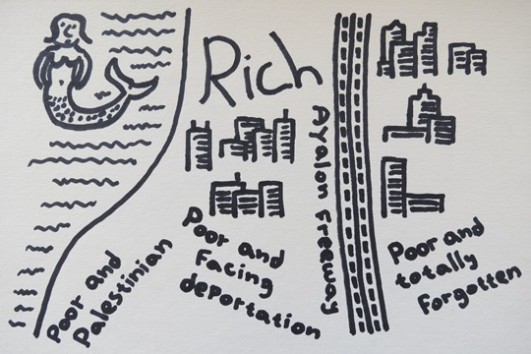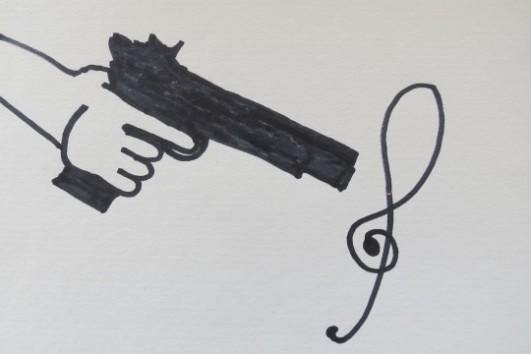In this country, looking at things differently can really get your head spinning.
Part 13 of 15. To read the rest of the series, click here.
And so the project took a real conceptual shift. There was no denying it: this was the same shift my own political views took in recent years. Once I strongly believed in the dichotomy, and consequently in a two-state solution. Here is how I saw the map: west of the Green line, folks should sing Lorde in Hebrew. East of it: in Arabic. By now, however, and due to more developments and learning than I could dream to list here, I was more in the mindset of giving up lines and making sure every individual between the Jordan River and the Mediterranean Sea is well off.
I began to dream of a single democratic system, wherein any individual could raise whichever flag they wanted, but where that flag would not override principle human rights and the value of equality. The problem is one of dominance. One society maintains violent dominance over the other. Encouraging both societies to embrace their myriad identities is one way to promote equality. Once they would no longer conceive of themselves as a pair of boxers in a ring, once the identities are legion rather than two, no single one would have the right or power to override others.
This sort of thinking is seen as subversive in today’s Israel, but here is what I learned from Mira Awad on that long ride north: in order for the Lorde tribute to succeed, it has to be subversive. The most subversive act is to not think the way we are told to think. My life I was told to think about “us” and “them.” Even in the hopeful 90s, when “they” were potential partners for peace, they were still “them.” The Lorde Project finally allowed me to decisively get past this paradigm. I stopped thinking about collaborating with the other. We were all “us” and we were all “others” — an idea that undermines both Zionism and Palestinian nationalism. I loved it.
The easy part’s over now
Ruthie had a meeting in a part of the city where meetings aren’t often held. She was going to the Hatikva neighborhood, a working class quarter just east of the highway that marks the boundary of Tel Aviv’s downtown. I opted to accompany her. The final days of January were spring-like and the sunny streets were a delight.
We skirted the central bus station, passing the one block where Mizrahi music was once available on cassettes. The music playing there today caught my ear; the rhythm was distinctly East African, yet more relaxed than that of the Ethiopian music I know. The language was Arabic. Streets around the old station are now home to thousands of asylum seekers from Eritrea and Sudan. This would be the Sudanese groove.
We walked down Neve Sha’anan Street. This used to be the city’s cobbler district — old shoe shops, often owned by Persian Jews, still line the street. In between them are Eritrean restaurants, a Filipino grocery, a Romanian watering hole and an Indian store displaying strange balms at its window. The state seldom reads asylum petitions and locks up asylum seekers for long periods without trial. It often deports migrant workers along with their Israeli-born children. These people are seldom considered part of the social fabric, yet they, too, figure into the country’s identity puzzle. Lorde would have to be more prolific than Bach to provide all these languages with songs.
East of the highway, the mix remains overwhelming. We sat down for lunch at a Yemenite spot in Hatikva’s fabulous market ally. The food was much the same as what we had at Nehama’s on the day this whole ordeal began. I now looked at things differently. I had to do it justice. It urged me to find someone who sings in Yemenite Arabic.
“I dream of living in a world where the green schoog is as spicy as the red schoog” said Ruthie.
“Such simple worries you have.”
“Why, what do you worry about?”
“Listen to the music,” I implored, “Listen to the song that’s playing in the background. Do you hear it?”
I hummed along:
The easy part’s over now
We’ve come to the end
The easy part’s over now
And the hard part begins…
“That’s Charlie Pride! It’s vintage country! This is what they’re playing at a jachnoon joint! Once you open your eyes to really look at this country, it’s absolutely insane. How am I ever going to sort the right five or six languages for the project? What would they be? So far we have Yiddish and French, and that is such a bloody random combination, that they don’t even seem totally relevant, but then again everything is so random, and what is relevant? And how would I find the right people to sing in the right languages? It’s just too much. This entire place is too much.”
Kurdish horizon
I needed help. I needed a supportive community. Uptown, in a pleasant cafe on Dizengoff Square, I met up a few days later with DJ, attorney and Mizrahi activist Ophir Toubul. He is editor of Cafe Gibraltar music blog, where the diverse sounds of this country are discussed in terms of identity and social politics.
I asked Ophir if he would publish a call for musicians to participate in my project on the site. He said they had just put out a similar call for an anthology of Israeli female vocalists. He didn’t wish to confuse readers with another. Not just yet.
“But Ophir,” I pleaded, “What am I going to do? I don’t know where to start!”
“Try Ilana Eliya,” he suggested. “She’s into hip hop.”
“Ilana Eliya, the Kurdish singer?” Now, there was a name I knew and admired. “Hip hop? Really?”
“Uh oh,” Ophir glanced at his phone, “Looks like a war just broke out.”
I quickly pulled out my own. Two Israeli soldiers were killed by Hezbollah on the Lebanese border, clearly in retaliation for a recent Israeli attack on a convoy in Syria.
Dizengoff Square kept buzzing around two disheartened guys. Why should a war not erupt? The timing, seven weeks ahead of the elections, was convenient, we both agreed. A neat outburst of violence on the northern frontier would scare the voters into Netanyahu’s arms and assure his victory. What would become of his female vocalists’ project in the case of a war? What would become of my Lorde project? How is art possible in such a place?
War is frightening, not only for its violence. It drowns out any alternative thinking in a tide of “us vs. them” politics, a phenomenon I like to call “invasion of the body snatchers.” It always does that. Everyone talks the same. It is so terrifying and depressing, that it simply consumes all creativity. I bade Ophir farewell and grimly walked up Dizengoff. I had no energy. I was not about to call Ilana Eliya, despite how eclectic her taste was. The threat of war alone has killed my will. Less than six months passed since the most recent one, the one that left nearly 600 children dead in Gaza. This bloody reality. Could anyone blame me for being obsessed with Lorde? With New Zealand?
I remembered translating “Buzzcut Season” and realizing how poignant her lyrics sounded in Hebrew:
Explosions on TV
And all the girls with heads inside a dream
So now we live beside the pool
Where everything is good.
This was where I needed to be. I was reaching for somewhere simpler, trying to fly there on wings of song. One day I’ll reach it, I’ll just go there and I’ll never go home again. I can’t deal with home. Fuck home. Fuck home!
(Part 13 of 15. For more, click here, or join us on Facebook!)



